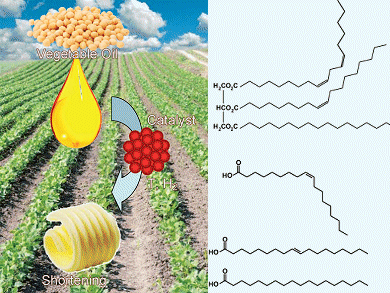In an Essay in Angewandte Chemie, An Philippaerts and co-workers, Katholieke Universiteit Leuven, Belgium, discuss the selective hydrogenation of vegetable oils in terms of its history and future. All-vegetable hydrogenated fats were first produced in the early 20th century in order to make stable and tasty food products from unstable oils. The hydrogenated fats became extremely popular as they were marketed as a healthier alternative to animal fats. However, the link between saturated fats and high cholesterol levels has been proven, and the hydrogenation process can lead to trans fats that have become well-known for their negative health impact.
In order to reduce the amount of trans fats in products, new approaches have to be used, including the use of tropical oils such as palm and coconut oil, which are already stable and do not need to be hydrogenated, and are also trans-free. Other alternatives include partial hydrogenation reactions that produce low trans levels, and the selective removal of trans isomers by using shape-selective zeolites. Given that legislation on the presence of trans fats in foods has been passed in both America and European countries, partial hydrogenation of vegetable oils to form trans-free products may well become a solution to this problem.
- Is there still a Future for Hydrogenated Vegetable Oils?
An Philippaerts, Pierre A. Jacobs, Bert F. Sels,
Angew. Chem. Int. Ed. 2013.
DOI: 10.1002/anie.201209731




